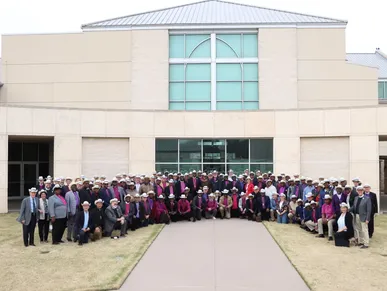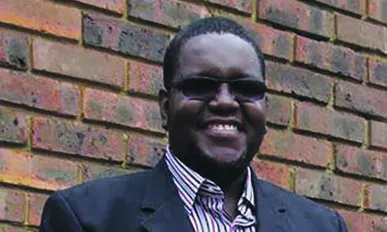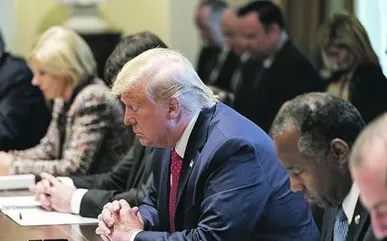
Evangelicals in Europe
Date posted: 20 Dec 2024
Dear Editor,
Please forgive a note to clarify some potentially damaging confusion in recommending churches for people moving abroad.

‘A rising tide lifts all boats:’ Why your church should back this mission
Nick McQuaker
Date posted: 3 Apr 2025
Almost 40 years ago, I entered the workplace as a new Christian and soon formed a friendship with Richard, who had joined the company as part of the same intake of school-leavers.
I began to share my faith and witness as best I could. A few months later, my local church held a mission weekend. I invited Richard to one or more of the special events that were taking place. To my delight, he said yes and came along. To my far greater joy, Richard gave his life to the Lord that weekend. This was a wonderful introduction to God using a local church mission to bring someone to faith.

Lausanne: Mission, unity, joy – and controversy

Iain Taylor
Date posted: 24 Oct 2024
More than 5,200 delegates from 202 countries shared bread and wine in a powerful display of evangelical unity at the end of the 2024 Lausanne Congress on World Evangelisation held in South Korea.
The informal Lord’s Supper was led by Korean and Japanese individuals as an example of how reconciliation in Christ brings different individuals and nations together.

CU mission encouragements

Milla Ling-Davies
Date posted: 1 Apr 2024
Christian Unions (CUs) have seen an increase in the number of students professing faith during their mission weeks.
In February, as they do each Spring, nearly 100 CUs across the UK held mission weeks on university campuses – a series of themed evangelistic events spread out over five days. While CUs have often seen students profess faith in the days and months following mission weeks, this year they saw many make a commitment during the weeks themselves.

Mission among Welsh speakers: an urgent need

Gwilym Tudur
Date posted: 13 Nov 2024
In mid-October, Wales held its annual Shwmae Su’mae Day. Translated roughly as ‘hi there’, both shwmae (pronounced shoe-mai) in south Wales and su’mae (pronounced see-mai) in north Wales are colloquial greetings used to start a conversation.
Held since 2013, the purpose of Shwmae Su’mae Day is to encourage people to begin conversations in Welsh and promote its use in everyday discussions. Now in its 11th year, Shwmae Su’mae Day has become a national occasion as businesses, workplaces, and universities host events to motivate employees and students to practice the language.

Anglican Mission in England to establish Diaconate
AMiE
Date posted: 10 Sep 2024
The latest Synod of the Anglican Mission in England (AMiE) has seen its three bishops present a detailed paper on why they have Anglican bishops, presbyters and deacons.
Lee McMunn writes: ‘Their substantial report traced the Biblical and historical roots for why we do what we do. We concluded that Anglican orders are very much fit for purpose, are for the blessing of the Church and should be joyfully embraced. As a result of our discussions, we resolved to establish a vocational Diaconate for godly and gifted men and women who have been properly identified and trained.’

evangelicals & catholics
Mission impossible?

Leonardo De Chirico
Date posted: 1 Apr 2024
Evangelicals have known for centuries that Rome is a ‘mission field’.
It is no coincidence that as soon as the breach of Porta Pia opened in 1870 (when Rome was liberated from Papal power and the Pontifical State ended), Bibles and Christian tracts were immediately smuggled in to further the evangelisation of the city. Rome was a mission field because it prevented the free circulation of God’s word in the vernacular language and suppressed any attempts to bring about a Biblical reformation.

The faith of Pol Pot's chief executioner
Julia Cameron
Date posted: 13 Apr 2025
Next week sees the 50th anniversary of the fall of its capital Phnom Penh on 17th April 1975, setting the stage for one of the most barbaric regimes in modern history.
By mid-afternoon on that fateful day the whole population of this elegant city was being forced into the countryside by Cambodian rebel leader Pol Pot and his Khmer Rouge army. Sidney Schanberg of the New York Times captured the brutality of those hours as patients in hospital, some still with saline drips attached to their arms, were pulled from their beds and thrust into the melée. There was no mercy.

We're no schismatics, declare conservative Anglicans
en staff
Date posted: 17 Mar 2025
Conservative Anglicans say they are in neither schismatic nor sectarian, but are wanting to renew the denomination with the Bible at the centre.
In a statement at the end of G25 - a conference for leaders of the Biblically orthodox GAFCON (Global Anglican Future Conference) movement which had "a special focus on the next generation of global bishop" - they reject accusations that they undermine unity in the denomination globally.

The lifesaving flights battling sorcery and snakebites
Gary Clayton
Date posted: 5 Apr 2025
Whether it’s snakebite or sorcery, Mission Aviation Fellowship (MAF) flights are making all the difference to the people of Papua New Guinea (PNG).
Growing up in Dodomona, in the Middle Fly District of Western Province, PNG, Titus Yabua witnessed many members of his community dying from treatable illnesses, accidents, snakebites and pig bites.

Myanmar: ‘Your prayer is our hope...’

Luke Randall
Date posted: 24 Apr 2025
Following the devastating earthquake in Myanmar, which has killed thousands and destroyed many buildings, evangelicals are reporting a desperate need for aid – and glimmers of gospel opportunity.
The 7.7 magnitude quake has prompted an immediate humanitarian crisis in a country which has been gripped by civil conflict for four years, with missionaries in the nation already experiencing a “tenfold increase” in requests for missionary aid even before the earthquake.
news in brief
Netherlands: Euthanasia increases
The number of deaths by euthanasia in the Netherlands rose by 10% last year. The regional euthanasia review committees found that the vast majority of the 9,958 people to have been euthanised in 2024 had advanced physical illnesses, but doctors have been urged to take great care when dealing with psychiatrically unwell patients.
The Guardian reports that the number of people who died by euthanasia increased by nearly 1,000 between 2023 and 2024 and, perhaps most startlingly, the number who were killed due to psychiatric illness rose from just two in 2010 to 219 last year.

Network celebrates 15 years
en staff
Date posted: 18 Apr 2025
The Grace Baptist Partnership, a network dedicated to planting, training and revitalisation, is celebrating 15 years of mission and outreach.
Representatives from more than 20 churches gathered at Dunstable Baptist Church for the annual Grace Baptist Partnership (GBP) Prayer and Praise gathering. The structure of the event flowed with the ministry emphases of GBP, namely growing leaders, planting and revitalising churches, and reaching nations.

USA: New task force to remove ‘anti-Christian’ bias

Emily Pollok
Date posted: 18 Apr 2025
President Trump is on a mission to get rid of “anti-Christian bias” in the US, creating a task force especially for the purpose.
Headed up by Attorney General Pam Bondi, the task force is to “immediately halt all forms of anti-Christian targeting and discrimination within the federal government”, Trump announced in Washington recently during National Prayer Breakfast events.
The loneliness epidemic - and the church's mission
'I don’t know how to say, "I’m lonely," without sounding like I’m saying, "I’m a loser,"' a middle-aged man said to me not long ago. 'And I don’t know how to say it without sounding like I’m an ungrateful Christian.'
After all, this man said, he’s at church every week—not just there, but active. His life is a blur of activities. But he feels alone. In that, at least, he’s not alone.
Repeatedly, almost all of the data show us the same thing: that the so-called 'loneliness epidemic' experts warned about is real. We all know it’s bad, and we sometimes have a vague sense of why it’s happening. The answers that some come up with are often too big to actually affect any individual person’s life. Smartphones aren’t going away. We aren’t all moving back to our hometowns. We see a kind of resigned powerlessness to change society’s lonely condition. So why can’t the church fix this?
Robert Putnam: Bowling Alone
The answer lies partly in a book published a near quarter-century ago: political scientist Robert Putnam’s famous Bowling Alone: The Collapse and Revival of American Community. Earlier this summer, The New York Times interviewed Putnam, asking him whether, since he saw the loneliness crisis coming, he saw any hope of it ending.
Putnam reiterated that the answer is what he calls 'social capital,' those networks of relationships needed to keep people together. Social capital comes in two forms, Putnam insists, and both are necessary. Bonding social capital is made up of the ties that link people to other people like themselves. Bridging social capital consists of the ties that link people to those unlike themselves.
The first time I was on set with a television talk-show host who, like me, grew up Southern Baptist, he turned to me before we went on the air and said, 'Pop quiz: What should always be the first song in a hymnal?' I immediately responded with the right answer ('Holy, Holy, Holy'), and we high-fived. No one else on that set knew what we were talking about. The secularist in the producer’s chair might have thought, 'What’s "Holy, Holy, Holy"?' The churchgoing evangelical behind the camera might well have thought, 'What’s a hymnal?'
That little detail of shared tribal memory, though, represented more than trivia. It was a way of recognizing one another—the same sort of church background, from the same sort of time period, the same sort of shared experience. We knew in that moment that, even if no one else in New York City knew the names of Lottie Moon and Annie Armstrong, we did, and, even if no one in that television network building could say what words would follow 'I pledge allegiance to the Christian flag,' we would. All of us experience equivalent moments of bonding social capital.
Putnam makes it clear that one form of social capital is not 'good' and the other 'bad.' When you’re sick and need to be taken care of, usually that comes from relationships made with bonding capital. That’s good, but—when taken too far—really dangerous. Putnam notes that the Ku Klux Klan is 'pure social capital' of the bonding sort. Bridging capital, Putnam argues, is much harder, but both are needed for a person or a society to escape isolation.